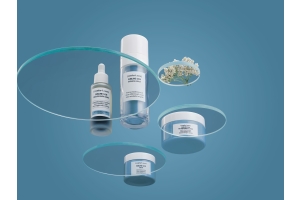Table of Contents
Hyaluronic acid is a well-known staple in a comprehensive anti-aging skincare routine. Its hydrating properties make it a key ingredient in several beauty products, including anti-aging serums.
It is also naturally present in the skin, like collagen. However, as we age, just like collagen, hyaluronic acid decreases, hence the interest in using it in skincare products or supplements. So what does hyaluronic acid do to your skin? How to use a hyaluronic acid serum? Let’s take a deep dive.
What Does Hyaluronic Acid Do for Skin?
The main property of hyaluronic acid is its hydrating capacity, which is why it is a beneficial product for reducing fine lines and giving the skin a healthy appearance. Other hyaluronic acid serum benefits include wound healing, increasing skin elasticity, treating redness and eczema, and reducing wrinkles.
Hyaluronic acid can also help with acne in two ways. First, dehydrated skin is more likely to produce excess oil, which can turn into blackheads and cause breakouts. By keeping the skin well hydrated, hyaluronic acid reduces this risk. Second, this acid promotes the healing of wounds and scars, which is also helpful for acne-prone skin.
Contrary to other anti-aging serums, hyaluronic acid serum does not specifically target dark spots, nor does it lighten the skin. If this is the result you are looking for, a Vitamin C serum or Retinol may be a better option. However, some serums combine several of these products, giving you the best of both worlds.
Do Dermatologists Recommend Hyaluronic Acid Serum?
Hyaluronic acid is recommended by dermatologists as it is a very efficient hydrating product yet gentle on the skin, so most people tolerate this ingredient well. To know which hyaluronic acid serum to choose, you should check the concentration of the acid and whether there are other active ingredients in the product.
Dermatologists recommended hyaluronic acid usually contains a concentration between 0.75 and 1.5%. Below this threshold, the benefits may be minimal, and concentrations over 2% could be irritating or cause dryness.
In addition to concentration, the molecular weight of hyaluronic acid affects its efficacy. Lower molecular weights penetrate the skin more deeply, providing hydration from within, while higher weights work on the surface to smooth and plump the skin. The product label will have details about the molecular weight. When selecting a serum, also consider if it includes complementary ingredients like vitamin C or peptides, which can enhance the serum’s overall skin rejuvenating effects
What Are the Disadvantages of Hyaluronic Acid?
Since hyaluronic acid is naturally present in the body, most people react well to it. However, there can be some side effects, especially if you the product is injected into the skin. Hyaluronic acid side effects can include swelling, bruising and soreness at the site of injection.
It’s also important to know that too much hyaluronic acid can, ironically, cause dryness in the skin. Avoid products containing 2% or more of the acid (unless told otherwise by a health professional) and be aware of the composition of your skincare products, as hyaluronic acid can be present in several of them.
When used as a serum, there aren’t actual disadvantages of hyaluronic acid. It’s a very potent humectant that is safe to use. It won’t target sunspots like other products, but it’s still a worthy addition to any skincare routine.
How to Use Hyaluronic Acid
Hyaluronic acid can be used by itself or mixed with other products. You’ll often find serums that combine hyaluronic acid with other active ingredients. As hyaluronic acid is hydrating and generally soothing for the skin, it can be used with most other products, even the harshest ones, including retinol. These two help each other out.
To harness the power of the product, it’s essential to know how to use hyaluronic acid. The best moment to apply hyaluronic acid is right after cleaning your skin, while it is still damp. Then you can lock in the hydrating effect with a face oil or a moisturizer. Be careful if several of your products contain hyaluronic acid at a higher concentration because you could end up using too much. Otherwise, it is perfectly safe to use this product every day. Some professionals recommend using it twice a day, in the morning and at night.
As you can see, hyaluronic acid serum is a fantastic choice due to its powerful hydrating and soothing benefits. Whether addressing dry skin or creating the ideal anti-aging skincare routine, this serum could be the key to achieving the skin of your dreams.







Entrez l'adresse e-mail associée à votre compte BeautySense, et nous vous enverrons un lien pour réinitialiser votre mot de passe.